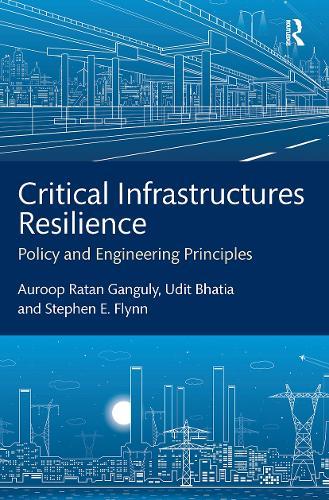Full Product Details
Author: Auroop Ratan Ganguly ,
Udit Bhatia ,
Stephen E. Flynn
Publisher: Taylor & Francis Ltd
Imprint: Routledge
Weight: 0.231kg
ISBN: 9781032241883
ISBN 10: 1032241888
Pages: 154
Publication Date: 13 December 2021
Audience:
Professional and scholarly
,
Professional & Vocational
Format: Paperback
Publisher's Status: Active
Availability: In Print

This item will be ordered in for you from one of our suppliers. Upon receipt, we will promptly dispatch it out to you. For in store availability, please contact us.
Reviews
'The book Critical Infrastructures Resilience is a fantastic addition to a knowledge area that is of increasing importance to our society today. At the same time that existing infrastructure is aging and deteriorating, the stresses upon them are increasing because of changing weather patterns and increasing incidence and frequency of extreme events. The authors, respected experts in this area, use this book to fill a knowledge gap, providing fantastic material to allow engineers and public policy professionals to better understand this complex problem and its solutions.' - Lucio Soibelman, Professor of Civil and Environmental Engineering, University of Southern California 'The resilience of urban communities to natural and anthropogenic hazards depends on the performance of the built environment and on supporting social, economic and public institutions functioning as integrated systems. This book is timely in light of the growth of urban infrastructure, populations and economic development in regions that are susceptible natural hazards, such as earthquakes, hurricanes coupled with storm surge, and sea level rise. Coverage includes major areas of concern to urban resilience assessment and risk mitigation: modeling critical infrastructure systems and their interdependencies, probabilistic risk assessment, and development of risk-informed public policy. Written at a time when resilience research is reaching a critical mass, this book is a welcome addition to the literature, providing a unique perspective by leaders in the field of critical infrastructure systems on quantitative urban resilience assessment.' - Bruce R. Ellingwood, Co-director, Center of Excellence for Risk-Based Community Resilience Planning, Colorado State University 'Harvey, Irma, Maria – common names for uncommon natural disasters that highlighted how brittle our cities and their infrastructure are. This book guides students and practitioners through the methodologies that can be used to quantify the risk natural and man-made events present to our infrastructure. Those learners will be better prepared to design more resilient cities and communities capable of withstanding increasingly common extreme events.' - Rafael L. Bras, Provost and Executive Vice President for Academic Affairs, Georgia Institute of Technology
'The book Critical Infrastructures Resilience is a fantastic addition to a knowledge area that is of increasing importance to our society today. At the same time that existing infrastructure is aging and deteriorating, the stresses upon them are increasing because of changing weather patterns and increasing incidence and frequency of extreme events. The authors, respected experts in this area, use this book to fill a knowledge gap, providing fantastic material to allow engineers and public policy professionals to better understand this complex problem and its solutions.' - Lucio Soibelman, Professor of Civil and Environmental Engineering, University of Southern California 'The resilience of urban communities to natural and anthropogenic hazards depends on the performance of the built environment and on supporting social, economic and public institutions functioning as integrated systems. This book is timely in light of the growth of urban infrastructure, populations and economic development in regions that are susceptible natural hazards, such as earthquakes, hurricanes coupled with storm surge, and sea level rise. Coverage includes major areas of concern to urban resilience assessment and risk mitigation: modeling critical infrastructure systems and their interdependencies, probabilistic risk assessment, and development of risk-informed public policy. Written at a time when resilience research is reaching a critical mass, this book is a welcome addition to the literature, providing a unique perspective by leaders in the field of critical infrastructure systems on quantitative urban resilience assessment.' - Bruce R. Ellingwood, Co-director, Center of Excellence for Risk-Based Community Resilience Planning, Colorado State University 'Harvey, Irma, Maria - common names for uncommon natural disasters that highlighted how brittle our cities and their infrastructure are. This book guides students and practitioners through the methodologies that can be used to quantify the risk natural and man-made events present to our infrastructure. Those learners will be better prepared to design more resilient cities and communities capable of withstanding increasingly common extreme events.' - Rafael L. Bras, Provost and Executive Vice President for Academic Affairs, Georgia Institute of Technology
Author Information
Auroop Ratan Ganguly is Professor of Civil and Environmental Engineering and Director of the Sustainability and Data Sciences Laboratory at Northeastern University. He has nearly 20 years' total work experience spanning the R&D organizations of Oracle Corporation and a best-of-breed company acquired by Oracle, as a senior scientist at the Oak Ridge National Laboratory, and within academia in multiple roles. His current research is at the intersection weather or climate extremes and water, infrastructural resilience and homeland security, as well as machine learning, statistics, and nonlinear dynamics. He has led or co-led projects worth about $19 million funded by NSF, NASA, DHS, DOE, DOD, and other agencies. Udit Bhatia is a PhD student in the Department of Civil and Environmental Engineering at Northeastern University. His research interests include infrastructure resilience, ecosystem recovery, climate, and hydrology. Previously, he served as Assistant Design Engineer (Structures) in MECON Ltd. (Government of India Enterprise). He was the founder of a successful engineering startup, the educational wing of which developed learning modules delivered to students through remote technologies and face-to-face interactions. Stephen E. Flynn is Professor of Political Science and Founding Director of the Global Resilience Institute at Northeastern University. Dr Flynn served as President of the Center for National Policy and as senior fellow for National Security Studies at the Council on Foreign Relations. He is one of the world’s leading experts on critical infrastructure and supply chain security and resilience. He is a member of the Homeland Security Science and Technology Advisory Council.




